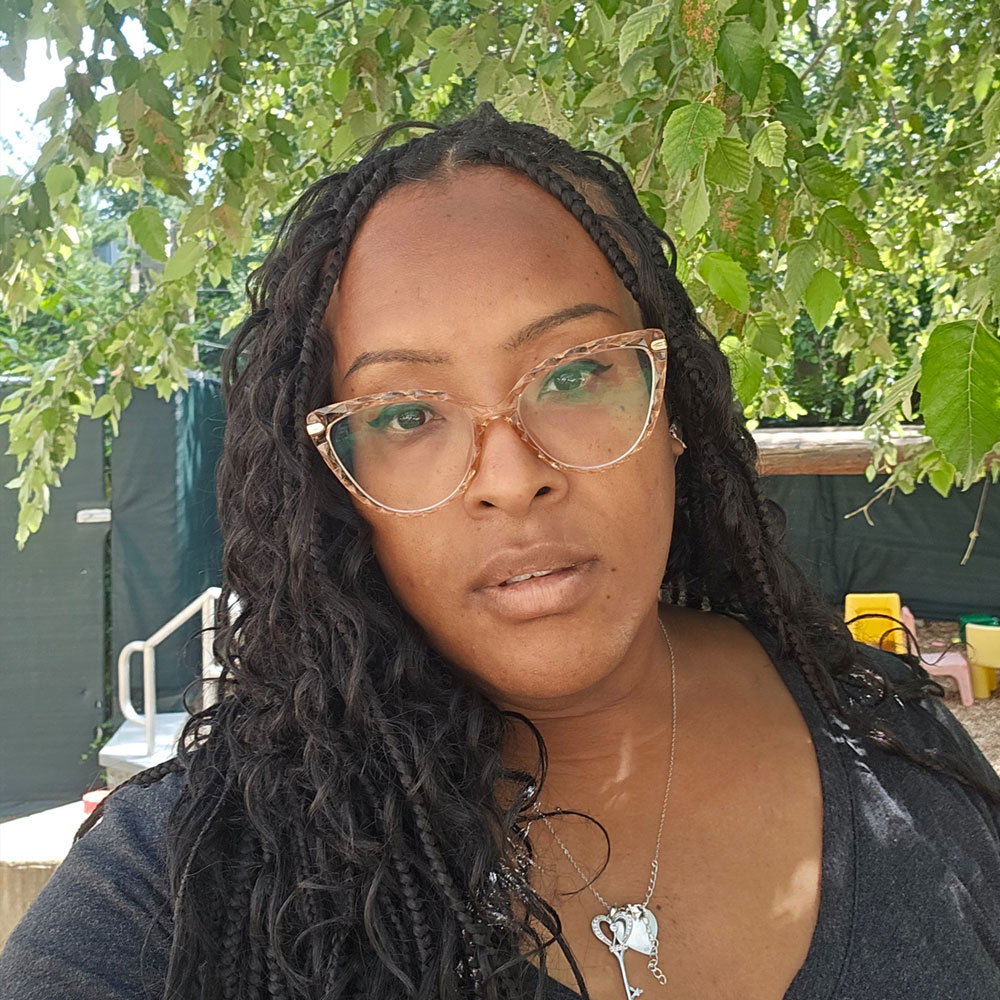Briyana Holloway remembers the shock when she saw her new paycheck. It was January 2024, and the Early Childhood Pay Equity Fund had given child care educators like her a raise in their paychecks through their employer. Her twice a month take-home pay had been $1800, and now it had leapt to over $2500 – nearly a 50% increase. For Holloway, who has a bachelor’s degree from Delaware State University and works as a lead teacher in a child care center in northwest D.C., this was the most amount of money she’d ever made.
The extra money changed her life. She enrolled in the NACA Housing Program to begin the process of purchasing her own home in Upper Marlboro, Maryland, where she lives now in an apartment with her partner and three boys. She can now pay her rent and her bills on time. One of her children has an autism diagnosis, and she has been able to purchase therapy aids for him, such as noise-canceling headphones and a weighted blanket, and she enrolled him in swim classes. She can afford gas for her car without any stress – which matters since she travels an hour each way for work.

Ashley Ross also saw a drastic pay bump. She has worked in child care for over 15 years and has seen a number of small salary bumps, including a several thousand increase after she received her associate degree through a specialized program, which allowed her to work and go to school simultaneously. But even after a decade of teaching and the extra credentials, Ross made a salary of $51,000, which made it hard for her to support herself and three children. When the D.C. Pay Equity Fund bumped up her salary, she made $63,000 a year, with her bimonthly take-home pay moving from $1500 to more than $2000 per pay period.
“Once this started, everything changed for me,” said Ross. She can easily pay her water bill and electricity bill, and she no longer receives threatening notices to have either turned off. She can pay the internet bill, so her 10-year-old can do homework. She no longer has to rely on her fiancée to pay an extra portion of the bills. She has more money for groceries, and can buy fresh food, such as whole grain pasta and organic yogurt instead of the cheapest options, like white noodles and mac and cheese. The healthier food is especially important for her 4-year-old daughter who has been diagnosed as pre-diabetic. When Ross’s daughter wants to go to a bounce house or out for ice cream, she has enough discretionary income to say yes. “I don’t have to tell her to wait until next week when Mommy gets paid.”
For child care workers all over the District of Columbia, the D.C. Pay Equity Fund, the $75 million program that allows early-child care educators to be paid similar salaries to their D.C. public school counterparts, has been “life-changing” and “shocking” and “gave me room to breathe” as described by educators when explaining what the salary difference did for themselves and their families.
At the time of its inception, the D.C. Pay Equity program was lauded for being forward-thinking and supporting educators who have been traditionally underpaid in this role, primarily women of color. Washington, D.C. was recognized as “a beacon” in the child care landscape, investing tens of millions of dollars into a child care system, including direct payments to providers and child care centers so that staff could be paid a livable wage. But Mayor Muriel Bowser’s proposed budget includes cuts would zero-out the Pay Equity Fund. (Washington, D.C. is one of the rare jurisdictions in the country to offer pre-K3 and pre-K4, though with limited spots). If the budget goes through with those existing cuts in place, teachers who received a pay bump through the D.C. Pay Equity Fund will now see a drastic pay cut in its place.
Note: The public budget hearing is May 3; the vote is slated for May 29.
Noah Hichenberg runs the Gan HaYeled Preschool at Adas Israel Congregation, where Briyana Holloway and Ashley Ross work. The D.C. Pay Equity funds have been “a total game changer” for his staff, allowing the school to recruit and retain teachers and show a level of respect for the profession and difficulty of the job, which has long been seen as separate from traditional public school teachers. Hichenberg says that 90-95% of the tuition revenue he gets from families goes to paying his staff, and even though the Gan doesn’t pay rent or mortgage for the building space they use in the Adas Israel Synagogue, they still cannot afford to pay their teachers the higher wages without the D.C. Pay Equity funds.
Without the funds, Hichenberg would have offered a new employee applying for a job a starting salary in the high 30,000’s or low 40,000’s. “It really diminishes anyone wanting to apply for these jobs,” he said. But the D.C. Pay Equity Fund came with mandatory levels of which to pay early childhood educators, aligning with their education level and role as a lead or assistant teacher. The fund was able to lift salaries for both new hires and existing employees, and Hinchenberg said many of his teachers were motivated to receive additional accreditation to reach that higher salary level.
For an employee like Holloway, with a bachelor’s degree and as a lead teacher, she now makes over $75,000. “Everyone has been in awe of this program,” Hichenberg says, referring to the other preschool directors and members of the early education field who have been aware of the innovative and transformative nature of the D.C. Pay Equity Fund program. “No one else pays their teachers $75,000.” Hichenberg says he has the most stable workforce he’s ever had this past school year, along with happier teachers since they have less financial stress at home.
But if the Fund goes away, as the budget is slated to zero out? Hichenberg doesn’t know how he can afford to keep the teachers, or how he can expect them to weather such a pay cut.
“To take this away now is cruel and callous,” said Hichenberg. “It’s far worse than not having attempted it in the first place.”
***
The D.C. Pay Equity Fund came out of the D.C. Early Childhood Educator Equitable Compensation Task Force, which was created by the D.C. Council in 2021 during the pandemic with the goal of finding ways to disburse funds from the District’s new tax increase on wealthy households. This was one of many programs that state and local governments created in response to the stress on child care providers that the pandemic had exacerbated. Hichenberg explained that when D.C.’s Office of the State Superintendent of Education first unveiled the program to educators, they reiterated multiple times to educators that “there is no sunset on this legislation” and it would exist in perpetuity. But it’s a piece of legislation, so politicians can still kill it, he explained. The goal had been to make early childhood educators’ compensation more equitable with people who worked in D.C. public school early childhood – including DCPS pre-K3 and pre-K4 teachers – the same job that Ross has, though she works at a private child care center. But the DCPS contracts are union-negotiated, so not eligible for cuts in the Mayor’s budget.

Neidia Ramsay-Swann has been working at the Gan for 8 years, and the salary bump under the D.C. Pay Equity Fund meant she no longer had to take on a second job to pay her bills. Under her previous salary, Ramsay-Swan picked up jobs over the weekends babysitting or caring for the elderly. When the synagogue needed weekend or holiday coverage, she volunteered to work to make the extra money. “But that took time away from my own family just to fill in that gap,” she said.
Ramsay-Swan had enrolled in the same associate degree program that Ashley Ross attended, and got a small bump to $47,000 per year after earning her degree. But after the D.C. Pay Equity raises, her income jumped to $63,000. For the first time that she can remember, she had money to put in her savings account. She could cover her own expenses without relying on her husband. “Now I can do it by myself. Which is like freedom. Who needs a man?” she asks, laughing.
The extra money meant Ramsay-Swan could help her daughter, who was pregnant and out of a job, pay her rent. And she’s saved enough to take a trip of her own this July, to Jamaica to visit her mother. Her face brightens when she explains that she hasn’t been to Jamaica in 30 years, and hasn’t seen her mother since 2007. “It’s been a really long time,” she said.
But if the program is cut, “It’s going to be sad,” she says. “You hear in life that you aren’t supposed to go backwards, only forwards. If the money stops, it’s going to be a lot of going backwards, a lot of planning, things you shouldn’t have to worry about again.”
LaVonda Butler-Means has worked at the Gan for six years, and the D.C. Pay Equity salary bump took her from $43,000 per year to the $50,000’s. She no longer chooses between groceries and gas to get to work – though Butler-Means says it was never a real choice, gas won because “of course I am going to come to work.” The extra money has allowed her to breathe, she explains, and enroll her two kids in extracurricular activities – gymnastics and swimming for her daughter and football and basketball for her son – though she is looking into soccer options for him as well.
The extra money allowed her to get caught up on her bills. “I had to play catch up from a long time ago, but I’m caught up,” she said. She can pay for school activities, for the book fair, for the small things her kids need and ask for. This year, when the Gan is closed for its spring break, Butler-Means and her family are going to Williamsburg, Virginia, for their first vacation in over a year. But her kids have gotten used to their activities, and Butler-Means recognizes she may have to pull them if the funds get cut. “I don’t like to tell them no, but if I don’t have it, I don’t have it,” she said.
Hichenberg says there is no winning path for his child care center if the D.C. Pay Equity funds go away. “I don’t have a waiting list of potential employees,” he says. “[These teachers] are going to walk away from the job because they can’t afford their lifestyles, and they aren’t flashy.” He doesn’t know if he can find someone to teach who can make $38,000 a year, and without the adequate number of staff, they can’t serve the families unless they raise tuition further. Yet D.C. has some of the highest child care costs in the country, and the Gan charges families $34,000 a year for full day, year-round child care, with a discount to $30,000 for members of the synagogue. “I don’t see how the whole operation sustains itself through this,” he said.
For the teachers, the uncertainty itself is harrowing. LaVonda Butler-Means tries to keep her kids from worrying about it. “Your kids are not supposed to know that you are actually struggling,” she said. But if the funds go away, “it will be a downward spiral for us.” Briyana Holloway is worried that she may no longer qualify for the home ownership program. She has the documentation now to prove she can provide the monthly mortgage payment, “but I can only prove this up until the program is taken away. I don’t know where I stand after that, honestly,” she said. Neidia Ramsay-Swan feels she’s already gotten “two strokes of good luck” – the associate degree program and then the pay bump. “But now it’s about to change,” she said.
Ashley Ross knows she may need to consider other options if the D.C. Pay Equity Funds cuts happen, but she doesn’t want to. She has worked in early childhood education her entire adult life. She loves the work but feels the role is chronically underappreciated, especially when programs like the D.C. Pay Equity Fund cuts threaten to take away the financial cushion her family has been given. “We don’t give teachers enough credit,” Ross said. “Parents love us of course. They need us to be able to work, and they trust that their children are safe with us. But we work really, really hard and we should be paid,” she said. “We are due for more shine.”

Rebecca Gale
Rebecca Gale is a writer with the Better Life Lab at New America where she covers child care. Follow her on Instagram at @rebeccagalewriting, and subscribe to her Substack newsletter, "It Doesn't Have to Be This Hard."


